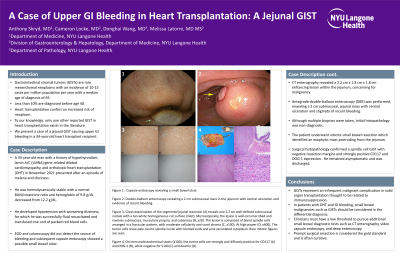Monday Poster Session
Category: GI Bleeding
P2051 - A Case of Upper GI Bleeding in Heart Transplantation: A Jejunal GIST
Monday, October 23, 2023
10:30 AM - 4:15 PM PT
Location: Exhibit Hall

Has Audio

Anthony F. Skryd, MD
NYU Langone Health
New York, NY
Presenting Author(s)
Award: Presidential Poster Award
Anthony F. Skryd, MD, Cameron Locke, MD, Donghai Wang, MD, Melissa Latorre, MD
NYU Langone Health, New York, NY
Introduction: Gastrointestinal stromal tumors (GISTs) are rare mesenchymal neoplasms with an incidence of 10-15 cases per million population per year and a median age of diagnosis of 65. Although the age of diagnosis can range between 10 to 100 years, less than 10% are diagnosed before the age of 40. A well-known increased risk of neoplasm among heart transplant recipients has been described. Nevertheless, there is a paucity of cases detailing GIST in solid organ transplantation, and to our knowledge, only one other reported GIST in heart transplantation exists in the literature. We present a case of a jejunal GIST causing upper GI bleeding in a 34-year-old heart transplant recipient.
Case Description/Methods: A 34-year-old man with a history of hypothyroidism, lamin A/C (LMNA) gene-related dilated cardiomyopathy, and orthotopic heart transplantation (OHT) in November 2021 presented after an episode of melena and dizziness. The patient was hemodynamically stable with a normal BUN/creatinine ratio and hemoglobin of 9.8 g/dL decreased from 12.2 g/dL. He developed hypotension with worsening dizziness, for which he was successfully fluid resuscitated and transfused one unit of packed red blood cells. An endoscopy and colonoscopy did not detect the source of bleeding, and a video capsule endoscopy showed a small bowel ulcer. A CT enterography revealed a 2.2 cm x 1.8 cm x 1.8 cm enhancing lesion within the jejunum. An antegrade double-balloon enteroscopy (DBE) was performed. The patient was found to have a 2 cm submucosal, jejunal mass with central ulceration and stigmata of recent bleeding. The area was tattooed proximally and distally. Although multiple biopsies were taken, the initial histopathology was non-diagnostic. The patient underwent a robotic small bowel resection which identified an exophytic mass protruding from the jejunum. Surgical histopathology confirmed a spindle cell GIST with negative resection margins and strongly positive CD117 and DOG-1 expression. He remained asymptomatic and was discharged.
Discussion: GISTs represent an infrequent malignant complication in solid organ transplantation thought to be related to immunosuppression. In patients with OHT and GI bleeding, small bowel malignancies such as GISTs should be considered in the differential diagnosis. Clinicians must have a low threshold to pursue additional small bowel diagnostic tests such as CT enterography, video capsule endoscopy, and deep enteroscopy. Prompt surgical resection is considered the gold standard and is often curative.

Disclosures:
Anthony F. Skryd, MD, Cameron Locke, MD, Donghai Wang, MD, Melissa Latorre, MD. P2051 - A Case of Upper GI Bleeding in Heart Transplantation: A Jejunal GIST, ACG 2023 Annual Scientific Meeting Abstracts. Vancouver, BC, Canada: American College of Gastroenterology.
Anthony F. Skryd, MD, Cameron Locke, MD, Donghai Wang, MD, Melissa Latorre, MD
NYU Langone Health, New York, NY
Introduction: Gastrointestinal stromal tumors (GISTs) are rare mesenchymal neoplasms with an incidence of 10-15 cases per million population per year and a median age of diagnosis of 65. Although the age of diagnosis can range between 10 to 100 years, less than 10% are diagnosed before the age of 40. A well-known increased risk of neoplasm among heart transplant recipients has been described. Nevertheless, there is a paucity of cases detailing GIST in solid organ transplantation, and to our knowledge, only one other reported GIST in heart transplantation exists in the literature. We present a case of a jejunal GIST causing upper GI bleeding in a 34-year-old heart transplant recipient.
Case Description/Methods: A 34-year-old man with a history of hypothyroidism, lamin A/C (LMNA) gene-related dilated cardiomyopathy, and orthotopic heart transplantation (OHT) in November 2021 presented after an episode of melena and dizziness. The patient was hemodynamically stable with a normal BUN/creatinine ratio and hemoglobin of 9.8 g/dL decreased from 12.2 g/dL. He developed hypotension with worsening dizziness, for which he was successfully fluid resuscitated and transfused one unit of packed red blood cells. An endoscopy and colonoscopy did not detect the source of bleeding, and a video capsule endoscopy showed a small bowel ulcer. A CT enterography revealed a 2.2 cm x 1.8 cm x 1.8 cm enhancing lesion within the jejunum. An antegrade double-balloon enteroscopy (DBE) was performed. The patient was found to have a 2 cm submucosal, jejunal mass with central ulceration and stigmata of recent bleeding. The area was tattooed proximally and distally. Although multiple biopsies were taken, the initial histopathology was non-diagnostic. The patient underwent a robotic small bowel resection which identified an exophytic mass protruding from the jejunum. Surgical histopathology confirmed a spindle cell GIST with negative resection margins and strongly positive CD117 and DOG-1 expression. He remained asymptomatic and was discharged.
Discussion: GISTs represent an infrequent malignant complication in solid organ transplantation thought to be related to immunosuppression. In patients with OHT and GI bleeding, small bowel malignancies such as GISTs should be considered in the differential diagnosis. Clinicians must have a low threshold to pursue additional small bowel diagnostic tests such as CT enterography, video capsule endoscopy, and deep enteroscopy. Prompt surgical resection is considered the gold standard and is often curative.

Figure: Figure 1: Video capsule endoscopy revealing a small bowel ulcer.
Figure 2: Double-balloon enteroscopy revealing a 2 cm submucosal mass in the jejunum with central ulceration and evidence of recent bleeding.
Figure 3: Gross examination of the segmental jejunal resection (A) reveals one 2.2 cm well-defined submucosal nodule with a tan-white homogeneous cut surface (inlet). Microscopically, the lesion is well-circumscribed and involves submucosa, muscularis propria, and subserosa (B, x20). The lesion is composed of bland spindle cells arranged in a fascicular pattern with moderate cellularity and scant stroma (C, x100). At high power (D, x400), the tumor cells show pale oval to spindle nuclei with blunted ends and pink vacuolated cytoplasm. Rare mitotic figures are seen.
Figure 4: On immunohistochemical stains (x100), the tumor cells are strongly and diffusely positive for CD117 (A) and DOG-1 (B) while negative for S100 (C) and desmin (D).
Figure 2: Double-balloon enteroscopy revealing a 2 cm submucosal mass in the jejunum with central ulceration and evidence of recent bleeding.
Figure 3: Gross examination of the segmental jejunal resection (A) reveals one 2.2 cm well-defined submucosal nodule with a tan-white homogeneous cut surface (inlet). Microscopically, the lesion is well-circumscribed and involves submucosa, muscularis propria, and subserosa (B, x20). The lesion is composed of bland spindle cells arranged in a fascicular pattern with moderate cellularity and scant stroma (C, x100). At high power (D, x400), the tumor cells show pale oval to spindle nuclei with blunted ends and pink vacuolated cytoplasm. Rare mitotic figures are seen.
Figure 4: On immunohistochemical stains (x100), the tumor cells are strongly and diffusely positive for CD117 (A) and DOG-1 (B) while negative for S100 (C) and desmin (D).
Disclosures:
Anthony Skryd indicated no relevant financial relationships.
Cameron Locke indicated no relevant financial relationships.
Donghai Wang indicated no relevant financial relationships.
Melissa Latorre: Medtronic – Consultant. Motus GI – Consultant. Olympus – Consultant. OVESCO – Consultant. VTI – Consultant.
Anthony F. Skryd, MD, Cameron Locke, MD, Donghai Wang, MD, Melissa Latorre, MD. P2051 - A Case of Upper GI Bleeding in Heart Transplantation: A Jejunal GIST, ACG 2023 Annual Scientific Meeting Abstracts. Vancouver, BC, Canada: American College of Gastroenterology.


